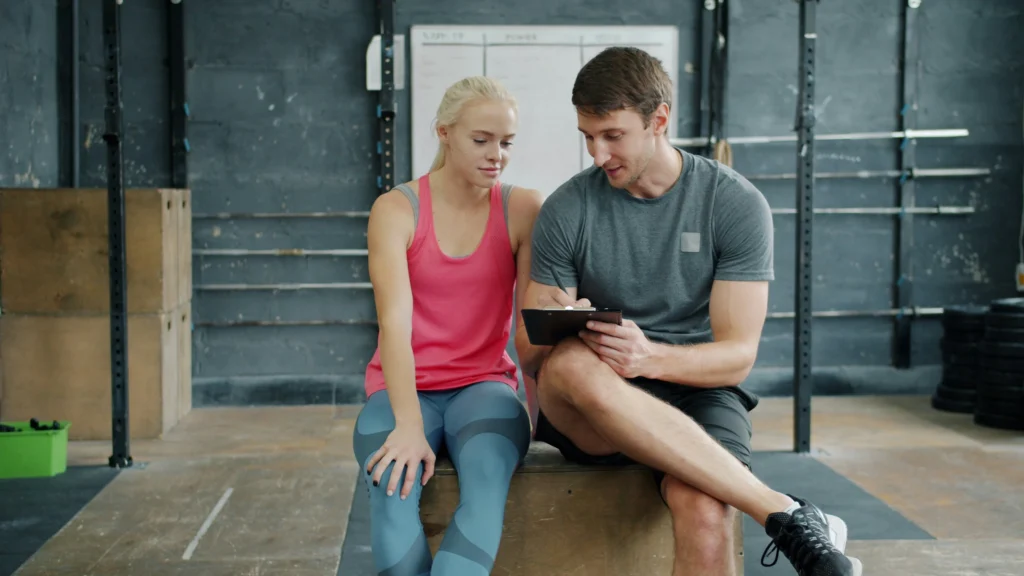As artificial intelligence-powered fitness tools boom, a troubling pattern has emerged: motivation for some, obsession for others. ATN spoke with personal trainers to find out what they’re seeing
AI fitness tools promise smarter workouts, but a new survey shows they may also be fueling harmful behaviors. Nearly half (46%) of personal trainers report seeing more clients skip meals, overtrain and struggle with anxiety tied to digital tracking.
The survey, conducted by Levity, a digital health company, polled 900 fitness enthusiasts and 100 trainers on how calorie-tracking apps, wearables and AI-driven goal-setting programs are affecting mental health.
The picture isn’t all bad — some users say the tools keep them motivated and on track. But for others, the same apps fuel anxiety and unhealthy habits.
The deeper AI embeds itself in fitness, wellness and nutrition platforms, the more urgent the question becomes: do we need to rethink how these tools are designed, marketed and monitored?
But first, the findings:
Thirty percent of users said they often prioritize an app’s goals over their body’s needs. Nearly half (45%) admitted to skipping meals or overtraining to stay within app limits. Sixty-one percent reported feeling anxious after missing a day of tracking, and 13% said it made them feel like they had failed. More than a quarter (27%) stopped using an app because it hurt their mental health.
Levity’s findings also show a generational split. Sixty-six percent of Millennials and 61% of Gen Z respondents reported anxiety when they missed tracking, compared to 37% of Gen X and Baby Boomers. Gen Z, a group highly attuned to health and wellness, was also the most likely to view calorie tracking itself as unhealthy, with 17% expressing concern.
Trainers are noticing the fallout. According to Levity, 46% percent of fitness professionals said AI tools are contributing to unhealthy or disordered behavior among clients, and 20% said these tools make it harder for people to trust their own bodies. Perhaps the most startling stat? 79% reported having to re-educate clients after they followed harmful or inaccurate AI advice.
Brandon Grant, a certified personal trainer and owner of Notorious Fitness in Las Vegas, says he sees this problem with his own clients.
“Over-dependence on AI fitness tools and technology causes issues because people may stop listening to their body and just push through to do whatever the AI recommends,” Grant says. “I’ve heard from clients that ‘calories don’t matter’ and that you can ‘out train a bad diet.’ The research shows that this isn’t the case, and to reach their fitness goals, it requires a balance of nutrition and fitness.”
 credit: Photo by Annie Spratt on Unsplash
credit: Photo by Annie Spratt on Unsplash
Grant adds that while AI can provide useful information, it has to be applied in the right way to help people succeed.
“Working with a personal trainer will always give people the accountability aspect that helps them stay motivated and focused on their goals,” he adds.
Are People Becoming Too Reliant on Digital Fitness Guidance?
Some trainers said they feel professionally undermined, with 53% reporting that clients trust apps more than their input. Yet 32% acknowledged that clients often achieve better outcomes when AI tools are paired with professional guidance. The motivations driving users are familiar, Levity found, as 66% turn to apps to stay motivated, 47% to control weight or body fat and 43% to improve performance or recovery.
Marshall Weber, a certified personal trainer and owner of Jack City Fitness, says AI apps often create more problems than they solve. With a background in exercise science and psychology, Weber warns that generic AI-driven programs often miss the nuance needed for safe training.
“I can definitely see how people can pick up bad habits and even unrealistic training goals from AI-driven apps,” Weber says. “These apps are often more cookie-cutter than a bespoke workout experience. This can lead to overtraining or worse, injury.”
 credit: Dalibor Janeček on Unsplash
credit: Dalibor Janeček on Unsplash
His biggest concern, though, is with nutrition-focused platforms.
“Be aware of apps pushing extreme calorie cuts or fad-style diets that just are not sustainable,” he warns. “That stuff confuses people more than it helps.”
Still, Weber — like Grant — acknowledges that the technology can have an upside. “Apps can really motivate some clients because they make workouts feel accessible,” he says. “Sometimes just getting your foot in the door is the hardest part, and being excited about an app can bridge that gap for some. I believe that at the end of the day, tech should support fitness, not replace your trainer or dietician.”
Why the Human Touch Can’t Be (Fully) Replaced
Jenny Liebl, a senior product developer and master trainer at the International Sports Sciences Association (ISSA), says the issue with AI fitness tools is less about overtly harmful advice and more about gaps that leave people confused.
See Also
“You can get all this information, and it can distill it down to something you can actually use, but AI doesn’t help you stay motivated,” Liebl says. “AI doesn’t help you figure out where to exercise, how to use a machine or what an exercise even is. There are a lot of missing pieces in some of these tools, and that becomes the issue.”
While the advent of AI has employees in nearly every sector wondering what will be left of their careers in a few years, Liebl makes a compelling case that in fitness and wellness, a human touch won’t just be necessary but also welcomed for oversight and, above all, for genuine motivation.
She recalls meeting a woman who had generated a months-long workout plan with an AI tool but never started it.
“She had created it several weeks before, but hadn’t done a single workout,” Liebl says. “That’s the problem. AI can give you a program, but it can’t make you stick with it.”
 credit: Vitaly Gariev on Unsplash
credit: Vitaly Gariev on Unsplash
Liebl said the most common misinformation she sees clients bring in is simply “worrying about things they don’t need to be worried about.” With so much information available, clients often assume every piece of advice applies to them when, in reality, only a small fraction may be relevant.
She believes the best path forward is one that is balanced and pairs AI with human oversight.
“Maybe there’s a way where a program can be generated by AI, but then a fitness professional reviews it before it’s handed off to a client,” Liebl says. She compared it to Hudl, a video platform that uses AI to track sports stats but always has a human review the results before sending them back.
“It really comes down to prompting,” she adds. “We have to prompt AI appropriately to get the right information, and then have the right guardrails in place to make sure people are using it safely.”
All of this unfolds against a backdrop where AI isn’t going anywhere. The global AI in mobile apps market, valued at $27.7 billion in 2025, is projected to reach $322 billion by 2034, growing at a rate of more than 31% annually, according to Research and Markets. Health and wellness apps are expected to be the fastest-growing segment, driven by rising demand for personalized health monitoring, predictive analytics and AI-powered virtual coaching.
The question now may be whether the industry can deliver that growth without fueling more anxiety along the way.


